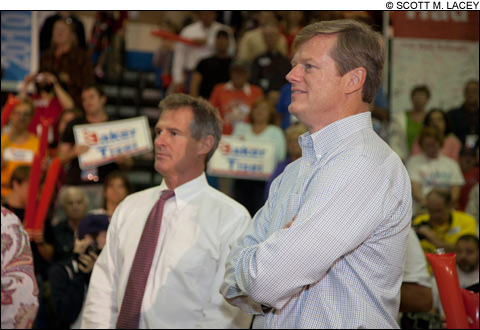It seems strange that someone who spent so many years as, essentially, a candidate-in-waiting, reached the starting gate so ill-at-ease with meeting new people. His wife likes to say that even when she would drag him to parties, he would just talk to his same handful of friends — a charge he readily admits.
Before this campaign, Baker has never really had to — or wanted to — work hard to be liked. Son and namesake of a well-connected GOP official (his father worked in both the Richard Nixon and Ronald Reagan administrations), product of what the Boston Globe recently described as a "charmed childhood," Baker was also smart, tall, good-looking, and a star athlete. He went to Harvard, and then took communication jobs at pro-business public-policy groups that tend to hire people with Republican insider connections: first the New England Council, and then the Massachusetts High Technology Council. After a return to academia, to earn an MBA from Northwestern University's Kellogg School of Management (where he met Lauren), Baker and his father essentially created, with wealthy conservative Lovett Peters, a whole new pro-business advocacy organization for the younger Baker to run — Pioneer Institute, where he served as executive director from its 1988 founding until Weld brought him into his administration in 1991. When he was ready to leave state government seven years later, he was quickly hired to head one of the state's largest health insurers — a position that not only earned him millions of dollars in salary over the next decade, but also put him on the boards of investment funds and public-private commissions.
Other successful candidates, including Weld and Romney, were similarly isolated and out-of-touch with average Massachusetts residents, and more or less embraced that upper-class, patrician air of entitlement.
Baker, however, doesn't see it in himself. "No. Most of my friends are ordinary, average people," he said when I asked him. "I am a middle-class-values kid. I've been very lucky in life, but I'm a pretty regular guy."
In a lot of ways, he is. And, he certainly wasn't handed fortunes like the ones Weld and Romney inherited, and Healey married into. (This is, in fact, a problem for him, as he doesn't have the means to self-fund a multi-million-dollar campaign as they did.)
But he also doesn't have the personality to come across as a relatable, regular guy, as new US Senator Scott Brown does.
Perhaps because he is so convinced of his own everyman status, Baker makes surprisingly little effort as a candidate — even when I pressed him on it directly — to convey any sense that he relates to, or even understands, the problems faced in droves by Massachusetts voters today.

IN A LOT of ways, Baker (right) is the “pretty regular guy” he says he is. So far, however, he hasn’t shown the personality that voters can relate to in the way they did with new senator Scott Brown. |
Angry, anyone?
Baker has fashioned his campaign on capturing voter anger at Beacon Hill, exemplified by its "Had Enough!" slogan. That strategy misses the public mood, which is driven more by anxiety about the recession's effects on their families and communities, according to many analysts and insiders — including some lower-ballot Republican candidates, not wishing to be named.